If you're battling chronic insomnia, several herbal teas can help. Chamomile, with its calming apigenin, is a popular choice. Valerian root increases GABA levels, promoting relaxation. Lavender tea soothes your nervous system, while passionflower interacts with GABA receptors to ease anxiety. Lemon balm enhances tranquility, and California poppy offers potent sedative properties. Don't forget about hops and catnip, both known for their sleep-inducing effects. For ideal results, try blending these herbs or rotating them throughout the week. Remember to consult your healthcare provider before starting any new sleep regimen. Discover how to brew these teas for maximum benefit and learn about potential side effects.
Chamomile: Nature's Sleep Elixir
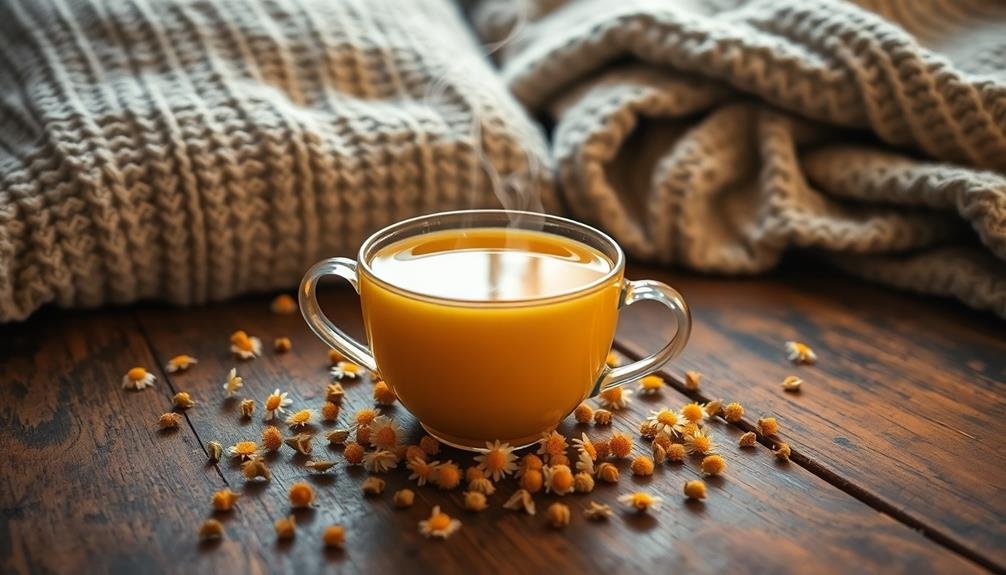
Countless insomnia sufferers turn to chamomile tea as their go-to natural remedy for better sleep. This ancient herb has been used for centuries to promote relaxation and improve sleep quality. Chamomile contains apigenin, a flavonoid that binds to specific receptors in your brain, potentially inducing sleepiness and reducing anxiety.
You'll find chamomile tea readily available in most grocery stores and health food shops. To prepare it, steep a tea bag or loose chamomile flowers in hot water for about 5 minutes. For best results, drink it 30 minutes to an hour before bedtime. Some people add a touch of honey for sweetness, which may enhance its calming effects.
While chamomile is generally safe for most people, it's essential to recognize that it can cause allergic reactions in those sensitive to plants in the daisy family. It may also interact with certain medications, such as blood thinners.
If you're pregnant, nursing, or taking any prescription drugs, consult your healthcare provider before incorporating chamomile tea into your nightly routine. Regular consumption of chamomile tea may help you establish a relaxing bedtime ritual, signaling to your body that it's time to wind down and prepare for sleep.
Valerian Root for Deep Sleep
If you've struggled with chamomile's effectiveness, valerian root might be your next go-to herbal remedy for deep sleep. This powerful herb has been used for centuries to combat insomnia and anxiety. Valerian root works by increasing gamma-aminobutyric acid (GABA) levels in your brain, promoting relaxation and reducing nervous system activity.
To brew valerian root tea, steep 1-2 teaspoons of dried root in hot water for 10-15 minutes. The tea has a strong, earthy flavor that some find unpleasant, so you might want to add honey or lemon to improve taste. For best results, drink valerian root tea 30-60 minutes before bedtime.
| Benefits | Side Effects | Precautions |
|---|---|---|
| Improves sleep quality | Headaches | Avoid if pregnant |
| Reduces anxiety | Dizziness | Don't mix with alcohol |
| Shortens time to fall asleep | Stomach upset | Consult doctor if on medications |
While valerian root is generally safe, it may cause mild side effects in some people. Start with a low dose and gradually increase if needed. If you don't notice improvements after a few weeks, consult your healthcare provider. Remember, herbal remedies aren't substitutes for addressing underlying sleep issues or practicing good sleep hygiene.
Lavender's Calming Sleep Properties
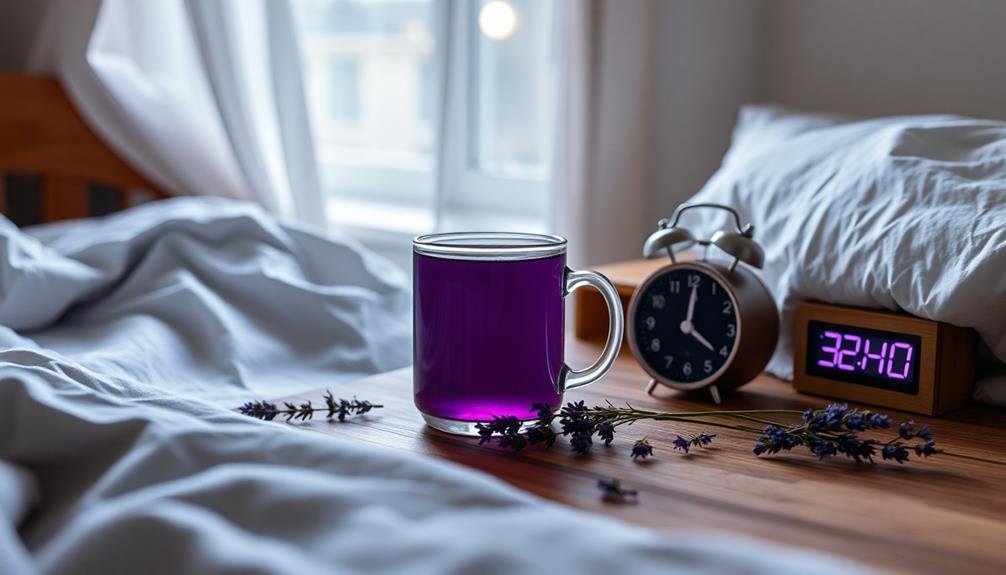
You'll find lavender to be a powerful ally in your fight against insomnia.
Its well-known sedative effects can help you relax and drift off to sleep more easily.
To harness lavender's calming properties, you can prepare a soothing tea by steeping dried lavender buds in hot water for 5-10 minutes.
Lavender's Sedative Effects
Among the many herbal remedies for insomnia, lavender stands out for its potent sedative effects. Its calming properties can help you relax and fall asleep faster, making it a popular choice for those struggling with chronic sleep issues.
Lavender's sedative effects work through various mechanisms in your body. It interacts with your nervous system, reducing anxiety and promoting relaxation. You'll find that inhaling lavender's aroma or drinking lavender tea can greatly improve your sleep quality.
Here's a breakdown of lavender's sedative effects:
| Effect | How it helps |
|---|---|
| Anxiety reduction | Calms racing thoughts |
| Muscle relaxation | Eases physical tension |
| Heart rate lowering | Promotes overall calmness |
| Increased GABA | Enhances sleep-inducing neurotransmitters |
To harness lavender's sedative effects, try incorporating it into your bedtime routine. You can use lavender essential oil in a diffuser, add dried lavender to your bath, or sip on lavender tea before bed. Remember, consistency is key when using herbal remedies for sleep. Give lavender a try for a few weeks to experience its full benefits and improve your sleep quality.
Preparing Lavender Tea
For those seeking to harness lavender's calming sleep properties, preparing lavender tea is a simple and effective method. You'll need dried lavender flowers, which you can purchase from health food stores or online retailers.
To brew the tea, start by boiling water in a kettle or pot. Once boiling, remove it from heat and let it cool for a minute.
Place 1-2 teaspoons of dried lavender flowers into a tea infuser or directly into your cup. Pour the hot water over the flowers and let it steep for 5-10 minutes, depending on how strong you prefer your tea. The longer it steeps, the more potent the flavor and effects will be.
After steeping, remove the infuser or strain out the flowers. You can enhance the taste by adding a teaspoon of honey or a splash of milk.
For maximum benefits, drink the tea about 30 minutes before bedtime. It's best to start with a small amount and gradually increase if needed, as lavender can be quite potent.
Remember to consult your healthcare provider before incorporating new herbal remedies into your routine, especially if you're taking medications or have existing health conditions.
Passionflower: Anxiety-Reducing Sleep Aid
Passionflower has gained popularity as a natural sleep aid, particularly for those struggling with anxiety-induced insomnia. This herb contains compounds that interact with your brain's GABA receptors, promoting relaxation and reducing anxiety.
You'll find passionflower available in various forms, including dried herbs for tea, tinctures, and capsules.
To prepare passionflower tea, steep 1-2 teaspoons of dried herb in hot water for 10 minutes. You can drink this tea 30 minutes to an hour before bedtime to help calm your mind and prepare for sleep. Some people combine passionflower with other sleep-promoting herbs like valerian or chamomile for enhanced effects.
While generally considered safe, you should be aware of potential side effects such as dizziness or confusion, especially when taking higher doses.
It's also important to consult your healthcare provider before using passionflower, particularly if you're pregnant, breastfeeding, or taking medications. Passionflower may interact with certain drugs, including blood thinners and sedatives.
When used responsibly, passionflower tea can be an effective, natural way to address anxiety-related sleep issues and improve your overall sleep quality.
Lemon Balm for Restful Nights
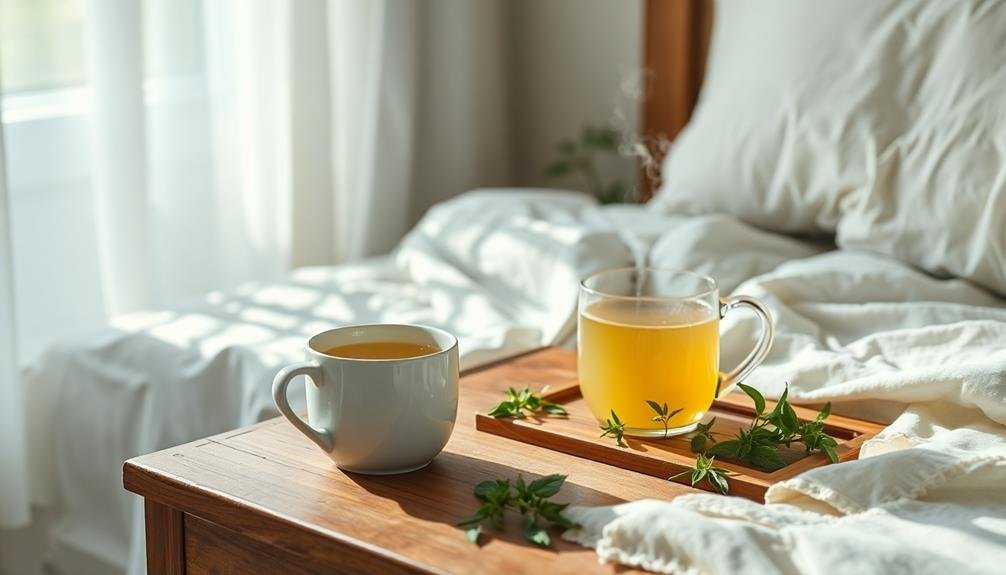
Known for its calming properties, lemon balm has emerged as a popular herbal remedy for those seeking restful nights. This fragrant herb, part of the mint family, has been used for centuries to promote relaxation and improve sleep quality.
You'll find that lemon balm tea can help reduce anxiety, ease stress, and soothe your mind before bedtime.
When you're struggling with chronic insomnia, lemon balm might be the natural solution you've been searching for. Its active compounds, including rosmarinic acid and flavonoids, work together to enhance GABA activity in your brain, promoting a sense of calmness and tranquility.
To make the most of lemon balm's sleep-inducing benefits, try these tips:
- Steep 1-2 teaspoons of dried lemon balm in hot water for 5-10 minutes
- Drink a cup 30-60 minutes before bedtime
- Combine with other sleep-friendly herbs like chamomile or valerian root
- Use fresh lemon balm leaves for a more potent brew
Magnolia Bark's Sleep-Enhancing Effects
While lemon balm offers a gentle approach to better sleep, magnolia bark presents a more potent solution for chronic insomnia sufferers. This powerful herbal remedy has been used in traditional Chinese medicine for centuries to promote relaxation and improve sleep quality.
Magnolia bark contains two key compounds: honokiol and magnolol. These bioactive substances interact with GABA receptors in your brain, inducing a calming effect similar to prescription sleep medications but without the harsh side effects.
You'll find that magnolia bark tea can help you fall asleep faster and experience fewer nighttime awakenings.
To prepare magnolia bark tea, steep 1-2 teaspoons of dried bark in hot water for 10-15 minutes. The taste can be bitter, so you may want to add honey or lemon for flavor. It's best to drink this tea about an hour before bedtime to allow the compounds to take effect.
Be aware that magnolia bark can interact with certain medications, particularly those metabolized by the liver. It's always wise to consult your healthcare provider before incorporating any new herbal remedy into your routine, especially if you're dealing with chronic insomnia.
Ashwagandha: Stress-Busting Sleep Supporter
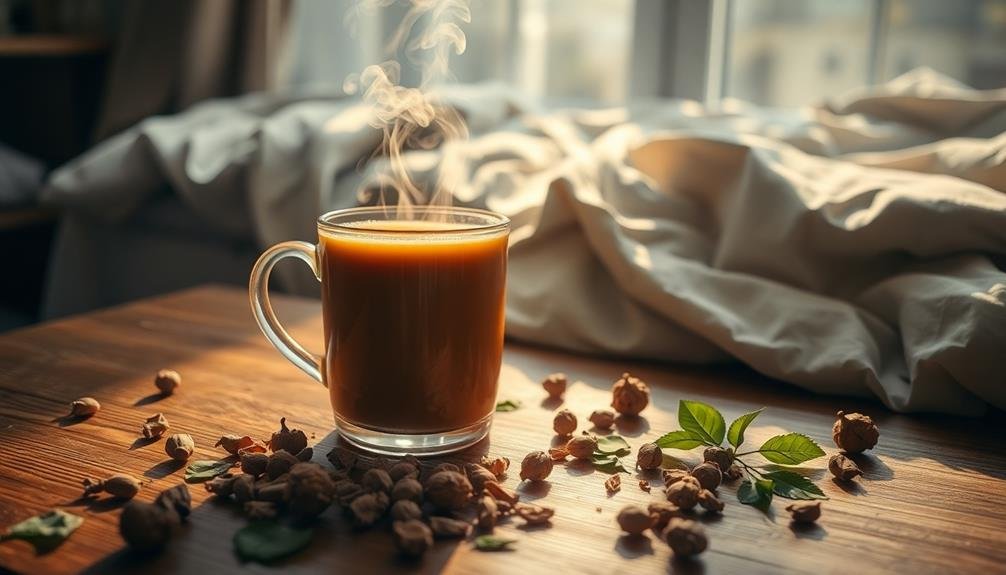
Insomniacs seeking a natural solution to their sleep woes may find relief in ashwagandha, an ancient Ayurvedic herb renowned for its stress-busting properties. This adaptogenic herb helps your body manage stress more effectively, which can greatly improve sleep quality.
Ashwagandha works by reducing cortisol levels, the stress hormone that can interfere with your sleep-wake cycle.
You'll find ashwagandha in various forms, but as a tea, it's particularly soothing before bedtime. Here's why you should consider incorporating ashwagandha tea into your nightly routine:
- Reduces anxiety and promotes relaxation
- Improves sleep quality and duration
- Enhances overall well-being and mental clarity
- Supports a healthy immune system
To prepare ashwagandha tea, steep 1-2 teaspoons of the dried root in hot water for 10-15 minutes. You can add honey or lemon for taste.
It's best to consume this tea 30-60 minutes before bedtime to allow its calming effects to take hold. While generally safe, consult your healthcare provider before adding ashwagandha to your regimen, especially if you're pregnant, breastfeeding, or taking medications.
Holy Basil for Balanced Sleep
If you're struggling with chronic insomnia, holy basil might be your next go-to herbal remedy.
This adaptogenic herb can help reduce stress and promote more balanced sleep patterns.
You'll find that holy basil not only aids in falling asleep but also improves overall sleep quality by addressing underlying stress-related issues.
Stress-Reducing Sleep Aid
How can a simple herb help combat the stress that keeps you awake at night? Holy basil, also known as Tulsi, is a powerful adaptogen that's been used for centuries in Ayurvedic medicine to promote relaxation and improve sleep quality. This stress-reducing sleep aid works by lowering cortisol levels, helping your body and mind unwind before bedtime.
When you're feeling overwhelmed and unable to sleep, try incorporating holy basil tea into your nightly routine. Here's how it can benefit you:
- Reduces anxiety and promotes calmness
- Balances stress hormones in the body
- Improves overall sleep quality
- Boosts your immune system while you rest
To prepare holy basil tea, steep 1-2 teaspoons of dried holy basil leaves in hot water for 5-10 minutes. You can drink it 30 minutes before bedtime to experience its calming effects.
For best results, combine holy basil tea with other sleep-promoting habits, such as maintaining a consistent sleep schedule and creating a relaxing bedtime environment.
Adaptogenic Herb Benefits
Along with its stress-reducing properties, holy basil offers a range of adaptogenic benefits that can help balance your sleep patterns. As an adaptogen, it helps your body resist various stressors, both physical and mental, which can disrupt your sleep cycle. Holy basil works by regulating cortisol levels, the hormone responsible for your body's stress response.
When you consume holy basil tea regularly, you'll likely notice improved sleep quality and duration. It can help normalize your sleep-wake cycle, making it easier to fall asleep at night and wake up feeling refreshed in the morning.
The herb's adaptogenic properties also support your adrenal glands, which play a significant role in managing stress and energy levels throughout the day.
Holy basil's benefits extend beyond sleep improvement. It can enhance your overall well-being by boosting your immune system, improving cognitive function, and reducing anxiety. These effects contribute to a more balanced state of mind, which is essential for maintaining healthy sleep habits.
To reap the full benefits, try drinking a cup of holy basil tea about an hour before bedtime, allowing its adaptogenic properties to prepare your body for restful sleep.
California Poppy's Sedative Qualities
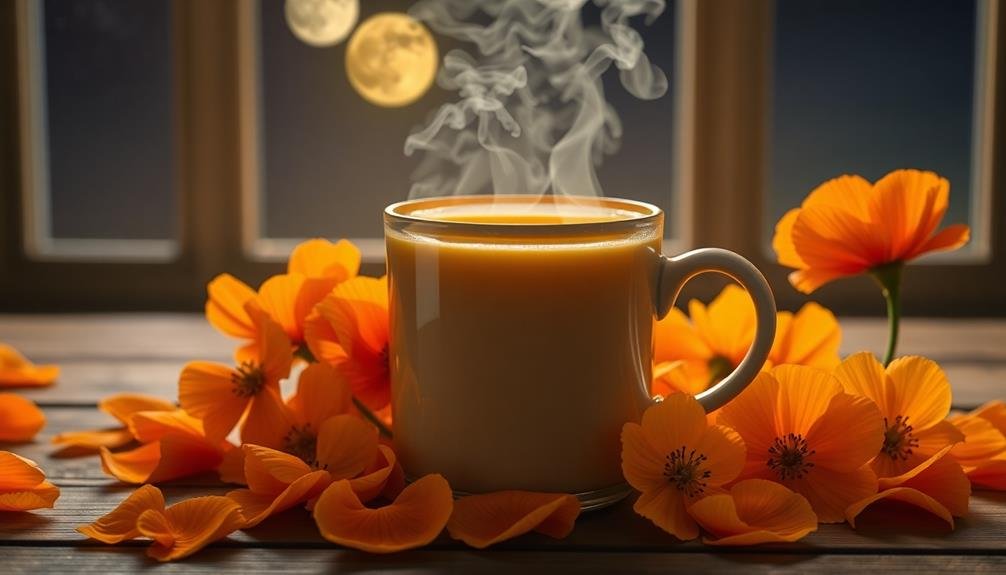
Among the natural remedies for insomnia, California poppy stands out for its potent sedative properties. This native North American herb has been used for centuries to promote relaxation and improve sleep quality. You'll find that California poppy can help you fall asleep faster and experience more restful slumber throughout the night.
The sedative effects of California poppy are attributed to its alkaloids, particularly protopine and californidine. These compounds interact with your brain's GABA receptors, producing a calming effect similar to prescription sleep medications but without the risk of dependency.
Here's what you need to know about California poppy's sedative qualities:
- It's non-addictive and doesn't cause grogginess upon waking.
- It can reduce anxiety and promote relaxation before bedtime.
- It's effective in treating both acute and chronic insomnia.
- It can be consumed as a tea, tincture, or supplement.
When brewing California poppy tea, steep 1-2 teaspoons of dried herb in hot water for 10-15 minutes. For best results, drink this tea about an hour before bedtime.
Remember to consult your healthcare provider before adding any new herbal remedy to your routine, especially if you're taking medications or have underlying health conditions.
Hops: Beyond Beer for Sleep
You might be surprised to learn that hops, the flower commonly associated with beer brewing, can also help you sleep better.
These cone-shaped blossoms contain compounds that promote relaxation and drowsiness, making them a valuable addition to your nighttime tea routine.
To harness the sleep-inducing benefits of hops, you'll want to steep them properly, ensuring you extract their sedative properties effectively.
Sleep-Inducing Properties of Hops
Many beer enthusiasts might be surprised to learn that hops, a key ingredient in their favorite brews, also possess potent sleep-inducing properties. This flowering plant has been used for centuries as a natural remedy for insomnia and restlessness. Hops contain compounds that interact with your brain's GABA receptors, promoting relaxation and drowsiness.
When you're looking to harness the sleep-inducing benefits of hops, you'll find several options available. Here are four ways to incorporate hops into your bedtime routine:
- Hop-infused herbal tea
- Hop extract supplements
- Hop-filled pillows
- Hop-based aromatherapy oils
These methods allow you to enjoy the calming effects of hops without the alcohol content of beer. Research has shown that hops can greatly reduce sleep latency, helping you fall asleep faster.
They may also improve overall sleep quality by increasing total sleep time and reducing nighttime disturbances. If you're struggling with chronic insomnia, adding hops to your nightly routine could be a game-changer.
However, it's crucial to consult with your healthcare provider before starting any new sleep aid, especially if you're taking medications or have underlying health conditions.
Brewing Techniques for Effectiveness
To maximize the sleep-inducing benefits of hops, proper brewing techniques are essential. Start by using fresh or recently dried hops, as older ones may lose potency. You'll need about 1-2 teaspoons of hops per cup of water.
Bring water to a boil, then remove it from heat and let it cool for a minute. This prevents scorching the delicate hops and preserves their beneficial compounds.
Add the hops to a tea infuser or directly into the water. Steep for 5-10 minutes, depending on your desired strength. Longer steeping times can increase bitterness, so taste-test as you go. Strain the tea and drink it about 30-60 minutes before bedtime.
For enhanced effectiveness, you can combine hops with other sleep-promoting herbs like chamomile or valerian root. Use equal parts of each herb, maintaining the same total quantity as you'd for hops alone.
Some find that adding a touch of honey helps mask the bitter taste of hops while providing additional relaxation benefits. Remember, consistency is key – incorporate this tea into your nightly routine for best results.
Catnip: Not Just for Felines
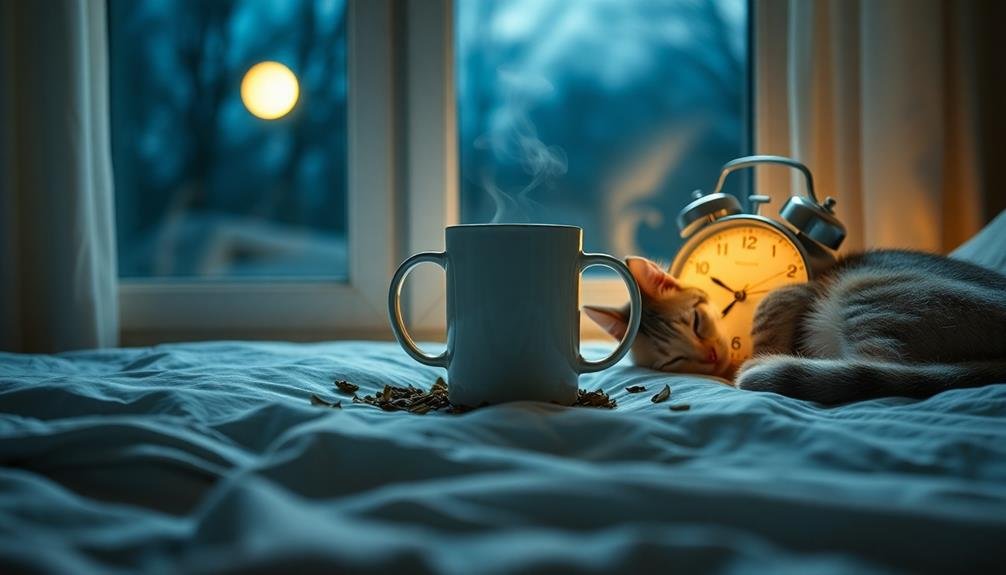
Catnip, a member of the mint family, isn't just a treat for your feline friends. This versatile herb can also be a powerful ally in your battle against chronic insomnia. When brewed into a tea, catnip's natural sedative properties can help calm your nerves and promote relaxation, making it easier for you to drift off to sleep.
To make the most of catnip tea for insomnia relief, consider these tips:
- Use fresh or dried catnip leaves, preferably organic, for the best results.
- Steep 1-2 teaspoons of catnip in hot water for 10-15 minutes.
- Drink the tea about 30 minutes before bedtime for ideal effect.
- Combine catnip with other sleep-promoting herbs like chamomile or valerian root for enhanced benefits.
While catnip is generally safe for most people, it's important to consult with your healthcare provider before incorporating it into your nightly routine, especially if you're pregnant, nursing, or taking medications.
Start with a small amount to gauge your body's reaction, and gradually increase the dosage if needed. You'll likely find that catnip tea becomes a soothing part of your bedtime ritual, helping you unwind and prepare for a restful night's sleep.
Blending Herbs for Optimal Sleep
Crafting the perfect herbal tea blend for sleep can take your insomnia-fighting efforts to the next level. By combining different herbs, you'll create a synergistic effect that enhances their sleep-inducing properties.
Start with a base of chamomile, known for its calming effects, and add valerian root for its sedative qualities. Include passionflower to reduce anxiety and promote relaxation.
For a more potent blend, consider adding lemon balm, which can improve sleep quality, or lavender, known for its soothing aroma. Don't forget about hops, which can increase sleep duration.
Experiment with ratios to find what works best for you, but generally, use equal parts of each herb.
When blending, be mindful of potential interactions. Some herbs, like St. John's Wort, can interact with medications. Always consult your healthcare provider before incorporating new herbs into your routine, especially if you're taking prescription drugs.
To prepare your blend, use one teaspoon of the mixture per cup of hot water. Steep for 5-10 minutes, strain, and enjoy about an hour before bedtime.
Frequently Asked Questions
Can Herbal Teas Interact With Prescription Sleep Medications?
Yes, herbal teas can interact with prescription sleep medications. You should always consult your doctor before combining them. Some herbs may enhance or counteract the effects of your medication, potentially causing unwanted side effects or reduced effectiveness.
How Long Does It Take for Herbal Teas to Improve Sleep Quality?
You'll notice improvements in sleep quality from herbal teas within a few weeks of regular use. However, individual results may vary. It's best to give it at least 2-4 weeks before evaluating the effects on your sleep patterns.
Are There Any Side Effects of Drinking Herbal Teas for Sleep Regularly?
While generally safe, you may experience side effects from regular herbal tea consumption. These can include headaches, nausea, or allergic reactions. Some teas might interact with medications or affect pregnancy. It's best to consult your doctor before regular use.
Can Children Safely Consume Herbal Teas to Help With Sleep Issues?
You shouldn't give children herbal teas for sleep without consulting a pediatrician first. Some herbs can be harmful to kids. Instead, focus on establishing a consistent bedtime routine and creating a sleep-friendly environment for your child.
What's the Best Time to Drink Herbal Tea for Maximum Sleep Benefits?
You'll get the most sleep benefits by drinking herbal tea 30-60 minutes before bedtime. This allows your body to absorb the calming compounds while giving you time to relax and wind down before sleep.
In Summary
You've now explored a variety of herbal teas that can help combat chronic insomnia. Remember, while these natural remedies can be effective, it's crucial to consult with your healthcare provider before starting any new sleep regimen. Experiment with different blends to find what works best for you. Don't forget that herbal teas are just one part of good sleep hygiene. Combine them with relaxation techniques and a consistent bedtime routine for the best results.

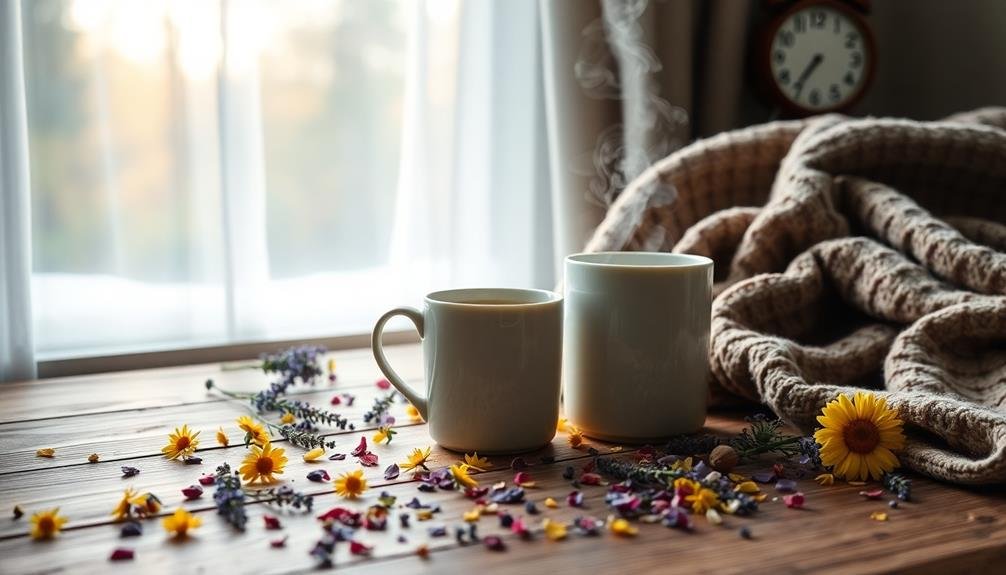



Leave a Reply